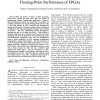Free Online Productivity Tools
i2Speak
i2Symbol
i2OCR
iTex2Img
iWeb2Print
iWeb2Shot
i2Type
iPdf2Split
iPdf2Merge
i2Bopomofo
i2Arabic
i2Style
i2Image
i2PDF
iLatex2Rtf
Sci2ools
TVLSI
2008
2008
Architectural Modifications to Enhance the Floating-Point Performance of FPGAs
With the density of FPGAs steadily increasing, FPGAs have reached the point where they are capable of implementing complex floating-point applications. However, their general-purpose nature has limited the use of FPGAs in scientific applications that require floating-point arithmetic due to the large amount of FPGA resources that floating-point operations still require. This paper considers three architectural modifications that make floating-point operations more efficient on FPGAs. The first modification embeds floating-point multiply-add units in an island style FPGA. While offering a dramatic reduction in area and improvement in clock rate, these embedded units have the potential to waste significant silicon for non-floating-point applications. The next two modifications target a major component of IEEE compliant floating-point computations: variable length shifters. The first alternative to LUTs for implementing the variable length shifters is a coarsegrained approach: embedded va...
| Added | 16 Dec 2010 |
| Updated | 16 Dec 2010 |
| Type | Journal |
| Year | 2008 |
| Where | TVLSI |
| Authors | Michael J. Beauchamp, Scott Hauck, Keith D. Underwood, K. Scott Hemmert |
Comments (0)

